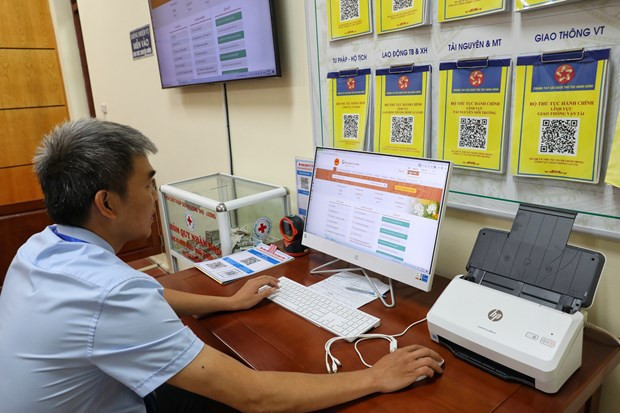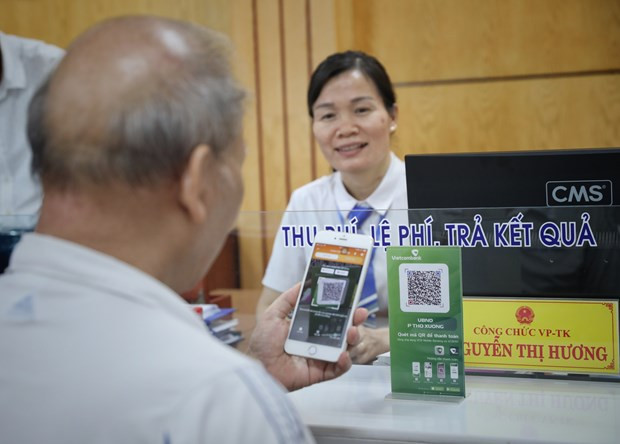 Computers are installed to help people search for information about procedures quickly at the one-stop department of the People's Committee of Tho Xuong ward, Bac Giang city. (Photo: VNA)
Computers are installed to help people search for information about procedures quickly at the one-stop department of the People's Committee of Tho Xuong ward, Bac Giang city. (Photo: VNA)Bac Giang (VNA) – According to the Bac Giang provincial People’s Committee, from now to 2030, the province will focus on developing e-government and digital transformation.
The move aims to advance administrative and business management models, working habits and lifestyle of the locals, creating new values for the socio-economic development.
By 2025, all online public services at Level 4 will be processed on various means of access, particularly on mobile devices. Over 95% of the work records at the provincial level, 85% work records at the district level and 65% work records at the commune level are processed on the online network environment, except for those classified as State secrets.
All database creating the foundation of the province’s e-government, digital transaction will be connected and shared, and all households and commune-level administrative units covered by fiber optic broadband network infrastructure.
In particular, Bac Giang will develop two smart urban areas, including Bac Giang city and Viet Yen district.
By 2030, the province also aims to have all local residents and enterprises will use online public services, and all state administrative agencies in the province will participate in opening data and providing open data for the development of e-government, digital economy and society. The building of smart urban platforms in Bac Giang city and Viet Yen district will be a success.
To achieve the goal, Bac Giang has developed a modern digital transformation data centre that meets at least Tier 3 standards with cloud computing technology and super-converged architecture.
 Scanning QR codes to transfer fees saves time and reduces costs at the one-stop department at People's Committee of Tho Xuong ward, Bac Giang city.(Photo: VNA)
Scanning QR codes to transfer fees saves time and reduces costs at the one-stop department at People's Committee of Tho Xuong ward, Bac Giang city.(Photo: VNA)The province has promoted high-quality specialised data transmission network infrastructure to ensure smooth connectivity at three administrative levels from the province to the commune. It has focused on developing digital platforms, including upgrading and developing the Provincial Data Sharing and Integration Platform (LGSP), building a platform to connect digital services using artificial intelligence technology.
The provincial People's Committee continues to direct the implementation of all the 25 essential public services integrated into the National Public Service Portal to serve the transaction needs of people and businesses.
The province has 100% of administrative procedures eligible under the law provided in the form of online public services. Online application rate is 81.12%; dossiers submitted directly and in other forms accounts for 18.88%.
All of people and businesses using online services are identified and authenticated on all systems of government levels from central to local./.



























